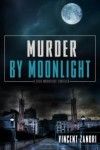Murder by Moonlight by Vincent Zandri
The idea of “humorous noir” is so rife with contradiction that it’s difficult to know what to make of an author who attaches that label to some of his work. But after talking with Vincent Zandri, author of MURDER BY MOONLIGHT, his latest release in the Dick Moonlight series, “humorous noir” starts to make sense.
Moonlight is a cop-turned-private detective who spends an inordinate amount of time making bad decisions in his personal and professional lives and getting into all sorts of trouble. That happens to a lot of us, but Moonlight’s got a pretty good excuse for his shortcomings, a fragment of a .22 caliber hollow point bullet lodged against the cerebral cortex in his brain. The injury affects his memory and compromises his ability to make rational decisions, and, for good measure, keeps him at death’s door.
A near-fatal brain injury that almost guarantees one disaster after another for the detective accounts for the “noir” part of the equation.
The humor? That comes with Zandri’s ability to make certain doom for his protagonist funny.
“Dick Moonlight really started in the gym,” Zandri explained. “There was this crazy dude who was working out all the time. He decided to become a masseur because he thought it was a great way to pick up women. It was the craziest thing I’d ever heard of. I was working on the character at the time, and I realized that because of the brain injury Moonlight could be as crazy as I want in the books. They’re serious, but really meant to be fun.”
In MURDER BY MOONLIGHT, the detective faces his toughest case yet, an apparently open-and-shut murder investigation that proves to be far more complicated than a first look at the clues suggests. Moonlight’s new client, socialite Joan Parker, barely survived a brutal ax attack that killed her husband. Questioned by the police at the scene, she identified her son, Christopher, as the killer. The problem that Moonlight must unravel is that Joan now admits that she has no recollection of the attack and, despite her accusation, she is convinced that Christopher actually is innocent. Moonlight is familiar with near-death experiences, uncooperative memory, and false accusations, and he takes the case.
The result for Moonlight, the author says, is “something more sinister than anything he’s ever come up against.”
Zandri was a journalist first, a novelist later. He took a time-tested path, one that worked for him at the time, but one that now may be out of style thanks to the digital revolution.
“I started out covering sports for the local newspaper, and worked my way up from there” he said. “Working as a journalist taught me to write and it honed my skills. Then writing school in Vermont. I expected to teach and write literary fiction, a novel every two or three years. But I always wanted to be a freelancer.”
Would he do things differently now?
“That’s just what you did at that point in time,” Zandri said. “But things have changed. My son wants to start with a novel, talking to readers through social media, without going through the traditional route of agents and publishers. There are more opportunities for authors today than there were when I started writing.”
Easier doesn’t necessarily mean better, though, he added.
“Maybe it’s too easy to get published now. There is a lot of garbage out there, but the gems seem to rise to the top. Talent, hard work, and perseverance always will pay off in the end.”
Along the way, Zandri began taking photographs.
“I took some photography courses at my liberal arts college, this was in the 1980s, but I wasn’t thinking about photojournalism at the time. One day, by chance, I had my camera equipment with me when I witnessed a serious automobile accident. I started snapping away. The local paper wanted to buy the photographs, and so did the lawyers. This is great, I thought. You take photographs and you get paid for it.”
Journalist-to-novelist is a relatively common career sequence, the transfer of similar skill sets from one occupation to the other a logical one. Photographer-to-novelist, on the other hand, doesn’t happen as often, even though a good photographer has an aptitude that translates well to writing. The ability to compose the elements of a scene into an effective photograph is a skill similar to creating an effective scene with words.
“A photographer sees the scene first, the same way a writer tries to picture a scene happening on the page,” Zandri said. Writers are taught to “show, don’t tell.” For photographers, showing and telling are one and the same.
Zandri’s writing and photography took him to exotic locales around the world. Now he’s cutting back on that part of his life, spending more time on writing fiction.
“I want to keep my hand in, though,” Zandri said of his journalistic pursuits. “It’s like getting paid to exercise. But I want a mixed bag of publishing opportunities and genres. The business could change tomorrow, and you have to be ready.”
Zandri can turn out a Dick Moonlight book in about six weeks—the next one is due for release in Spring 2013—but his traditional noir novels take a little longer to write. When we talked in mid-December, he was putting the finishing touches on THE GUILTY, the third novel in a well-received series featuring private detective Jack Marconi. There has been a 10-year break between this one and the earlier Marconi books, THE INNOCENT and GODCHILD.
“It was good to get back to Jack Marconi,” Zandri said, “good to get back to his voice.”
Zandri works in a variety of genres—journalist, photographer, writing school graduate, noir novelist—and media—print and digital. He’s a traditionalist who has embraced cutting edge technology. Considering the variety, I asked if there was a common theme running through all of his work.
“I want readers to finish one of my books and think it was money well spent,” he explained. “I really appreciate the people who have stayed with me, and I always keep them in mind. I’m going to work hard for my readers.”
*****
 Vincent Zandri is the author of THE INNOCENT, GODCHILD, THE REMAINS, MOONLIGHT RISES, and more. An adventurer and freelance photo-journalist, he lives in Albany, New York.
Vincent Zandri is the author of THE INNOCENT, GODCHILD, THE REMAINS, MOONLIGHT RISES, and more. An adventurer and freelance photo-journalist, he lives in Albany, New York.
To learn more about Vincent, please visit his website.
- Murder by Moonlight by Vincent Zandri - December 31, 2012
- The Dynamics of Murder: Kill or Be Killed by R. Barri Flowers - December 1, 2012
- The Other Woman by Hank Phillippi Ryan - September 30, 2012

